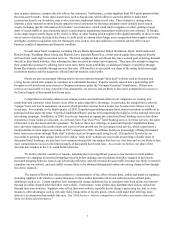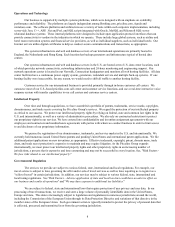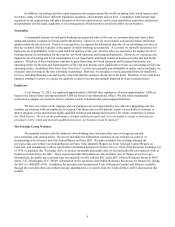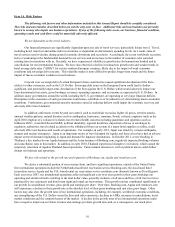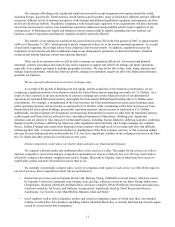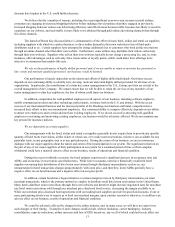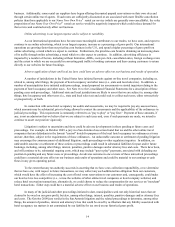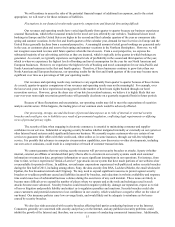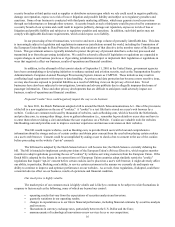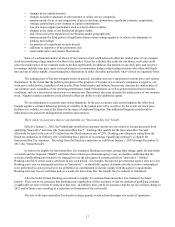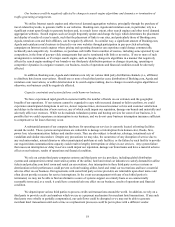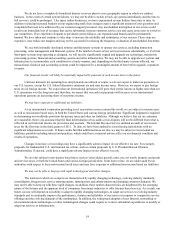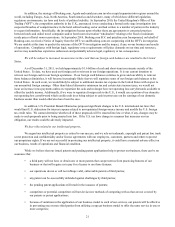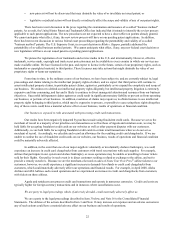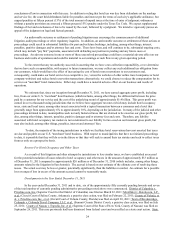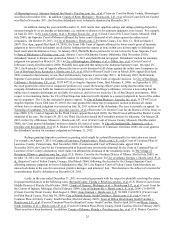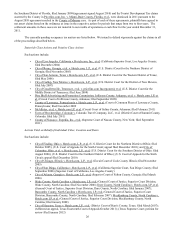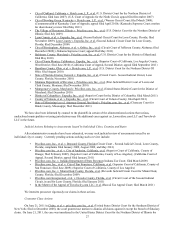Priceline 2011 Annual Report Download - page 18
Download and view the complete annual report
Please find page 18 of the 2011 Priceline annual report below. You can navigate through the pages in the report by either clicking on the pages listed below, or by using the keyword search tool below to find specific information within the annual report.17
• changes in our capital structure;
• changes in market valuations of other Internet or online service companies;
• announcements by us or our competitors of price reductions, promotions, significant contracts, acquisitions,
strategic partnerships, joint ventures or capital commitments;
• loss of a major supplier participant, such as a hotel chain or airline;
• changes in the status of our intellectual property rights;
• lack of success in the expansion of our business model geographically;
• announcements by third parties of significant claims or proceedings against us or adverse developments in
pending proceedings;
• occurrences of a significant security breach;
• additions or departures of key personnel; and
• stock market price and volume fluctuations.
Sales of a substantial number of shares of our common stock could adversely affect the market price of our common
stock by introducing a large number of sellers to the market. Given the volatility that exists for our shares, such sales could
cause the market price of our common stock to decline significantly. In addition, fluctuations in our stock price and our price-
to-earnings multiple may have made our stock attractive to momentum, hedge or day-trading investors who often shift funds
into and out of stocks rapidly, exacerbating price fluctuations in either direction, particularly when viewed on a quarterly basis.
The trading prices of Internet company stocks in general, including ours, have experienced extreme price and volume
fluctuations. To the extent that the public's perception of the prospects of Internet or e-commerce companies is negative, our
stock price could decline, regardless of our results. Other broad market and industry factors may decrease the market price of
our common stock, regardless of our operating performance. Market fluctuations, as well as general political and economic
conditions, such as a recession or interest rate or currency rate fluctuations, also may decrease the market price of our common
stock. Negative market conditions could adversely affect our ability to raise additional capital.
We are defendants in securities class action litigations. In the past, securities class action litigation has often been
brought against a company following periods of volatility in the market price of its securities. To the extent our stock price
declines or is volatile, we may in the future be the target of additional litigation. This additional litigation could result in
substantial costs and divert management's attention and resources.
There can be no assurance that we can maintain our "Innovation Box Tax" benefit.
Effective January 1, 2010, the Netherlands modified its corporate income tax law related to income generated from
qualifying "innovative" activities (the "Innovation Box Tax"). Earnings that qualify for the Innovation Box Tax will
effectively be taxed at the rate of 5% rather than the Dutch statutory rate of 25%. Booking.com obtained a ruling from the
Dutch tax authorities in February 2011 confirming that a portion of its earnings ("qualifying earnings") is eligible for
Innovation Box Tax treatment. The ruling from the Dutch tax authorities is valid from January 1, 2010 through December 31,
2013 (the "Initial Period").
In order to be eligible for Innovation Box Tax treatment, Booking.com must, among other things, apply for and obtain
a research and development ("R&D") certificate from a Dutch governmental agency every six months confirming that the
activities that Booking.com intends to be engaged in over the subsequent six month period are "innovative." Should
Booking.com fail to secure such a certificate in any such period - for example, because the governmental agency does not view
Booking.com's new or anticipated activities as "innovative" - or should this agency determine that the activities contemplated
to be performed in a prior period were not performed as contemplated or did not comply with the agency's requirements,
Booking.com may lose its certificate and, as a result, the Innovation Box Tax benefit may be reduced or eliminated.
After the Initial Period, Booking.com intends to reapply for continued Innovation Box Tax treatment for future
periods. There can be no assurance that Booking.com's application will be accepted, or that the amount of qualifying earnings
or applicable tax rates will not be reduced at that time. In addition, there can be no assurance that the tax law will not change in
2012 and/or future years resulting in a reduction or elimination of the tax benefit.
The loss of the Innovation Box Tax benefit in future periods would adversely impact our results of operations.


